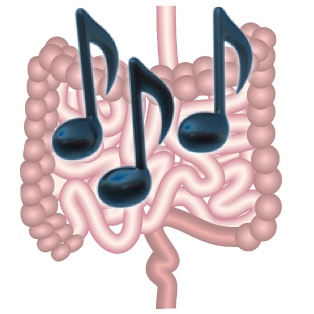Last week my guts started wheezing, singing, and croaking. I’ve never heard a belly make such noises! For hours, my tubes whistled and groaned and creaked and hissed and popped. They even made an “ek-ek-ek” sound, like cats in hunting mode.
None of this hurt. I was bemused, not alarmed.
And then everything went quiet and still. Too quiet. My bowels just stopped. And that was a little more ominous than the internal fart concert.

And then over the next 48 hours, nothing moved — very rare for me — and all my usual symptoms got steadily way worse: the gross fragility that at the core of my chronic illness, that feeling of being “inflamed” everywhere. A grievous, sickly headache also set in. I felt so woozy and queasy on the third night that I could barely sleep. Nasty business. 0/10, do not recommend.
And then things finally got going again, and that was… well, let’s just say it was an event, shall we?
And then, three hours later, I felt dramatically better. (Back to my baseline. Which is not a great place to be, but still a huge improvement.)
Could gut distress account for more of my chronic health problems than I have previously suspected? Because that sure felt like a bowel-powered exacerbation of the usual.
Welcome to many new subscribers in the last month, and sorry you haven’t seen a single new post! A series of family crises have derailed almost all normal work for weeks now. I feel like I’m finally getting back to normal… just in time for the craziness of the Christmas season. 😜
A few thoughts on the meaning of it all
Poor gut health is a favourite focus for people with unexplained illness because: (a) it’s such a plausible source of trouble, (b) nearly impossible to falsify, (c) it seems like something we might have a shot at improving, and (d) there is an army of experts and influencers pushing the idea. This is why every kind of gut health tonic flourishes in the marketplace. So I’m always very cautious entering this territory.
Despite my cynicism and the absence of clear gut symptoms, I had a strong “intuition” that my stuck guts were indeed to blame on that awful night. Maybe that was the wisdom of the body. But “intuition” is also often just “I got stuck on an emotionally compelling idea.”
Constipation might have made me feel horrible on this occasion, but that doesn’t necessarily mean that my guts are to blame for my usual health bullshit. Systemic malaise is a generic physiological response (like stress) that has a multitude of possible specific triggers. This is a major reason not to get too fixated on guts-blaming. Any kind chronic illness is going to be confused by other kind of trouble that crop up at random. Even fully healthy humans feel awful for unknown reasons sometimes, and such experiences are always superimposed on chronic illness, and can be huge diagnostic red herrings.
Still… if a couple days of gut trouble can do that to me, I don’t really care if it is a major cause of my usual troubles, or just a special guest star. I am keen to avoid it either way!
Occasionally, I get curious about the potential role of my guts in my chronic illness, but it’s rarely more than idle musing, because for the most part everything down there seems to have been working well. I have many pains, but rarely abdominal pain, or even indigestion. So at least there’s that. This has mostly kept gut-centric theories out of my speculations about what might be wrong with me, and I am surprised to find myself writing about it again today. It last came up in August with the appearance of a correlation between symptoms and ice cream, and now this.
Speaking of the ice cream thing, I have continued to test it, data is still accumulating… and although the theory still seems a bit ridiculous to me, I have to say it really does still feel like there might be something to it. (“More research,” as my wife would say, passing me a bucket of chocolate.)
I am skeptical that just a couple days of bowel stoppage could make me feel soooo baaaad. It’s rare for me to go more than a day without moving things along, but I don’t think two days is very long to go without a poop by human standards. But of course that doesn’t mean it’s harmless, or that I’m not unusually vulnerable.
Also, this was not ordinary constipation. It seemed “high”, like things had stopped well upstream… and I can imagine that this might have a more sickening effect than accumulation of waste in the lower tract, which is clearly built for garbage handling.
I may not have gut symptoms, but I do know that it’s possible for intestines to be surprisingly messed up without being at all obvious about it. For instance, bowel stagnancy (gastroparesis) is objectively verifiable in people with no gut symptoms… but they may well have systemic systems.
I actually have poop data!
My stupidly detailed health spreadsheet has shitty data! Yes, it’s true, I’ve been poop logging — for no particular reasons except that BMs seem like a standard health indicator, and it’s easy to track.
This was done very much in the spirit of "hey, it might turn out to be important someday," but never once did I really take it seriously.
And yet here we are. I’ve already observed an ice cream correlation. Is there a constipation correlation too? It won't mean much if there isn't one, but it sure will be interesting if there is! I’m predicting no correlation, because I think I rarely have constipation bad/weird enough to produce a clear signal. But the answer is…
No clear correlation. 🤷🏻♂️





Hi Paul, I've been a long-time reader and follower of your work! I found it back around maybe 2008-ish because of my own chronic pain, and then I went to school to became a RMT from 2011-2013, and was grateful to have the background of reading your work to give me a critical and informed approach about the limitations of the current curriculum in massage therapy education.... based on that background I was actually pretty disappointed in the education. Anyway, I haven't read your stuff in a while (I had a baby in 2020 and have been busy parenting), but I'm now catching up with Project try everything. I have also tried a lot of stuff for my own chronic pain and IBS, and the diet piece has been very helpful for me. I did a deep dive into reading about dietary stuff in around 2014 and came across the work of Sarah Ballantyne, Phd and did a couple of rounds of the autoimmune paleo protocol that she developed - I warn you that it is quite an intense and difficult dietary protocol, but in my opinion totally worth it. It helped me pinpoint a few different foods that I'm sensitive to and generally up-level my health. I would say it reduced my pain by around 50%, which is huge! Her work is very well referenced and evidence-based and I think you would appreciate her very grounded science approach. Here is a great place to start: https://www.thepaleomom.com/what-is-leaky-gut-and-how-can-it-cause/
"I am skeptical that just a couple days of bowel stoppage could make me feel soooo baaaad."
On the other hand, feeling soooo baaaad for any reason might involve central sensitization, which is a suspect in gut disorders, too. An unalerted brain might happily ignore most murmurings from our visceral nervous system, but an alerted brain?...
https://onlinelibrary.wiley.com/doi/abs/10.1111/nmo.14156
At PainScience, you once explained your dad's hyperacusis, and that, while humans can share external references to what is "too loud", we sadly can't for pain. I often get hyperacusis with migraines, and experience that amplified sound and amplified pain during migraine seem convincingly similar (though, of course, our experiences can fool us, too). Whatever my brain is doing during a migraine, it seems pretty good at convincing itself that noxiously heightening all the senses, not just pain, is somehow a good idea.
This is comforting in a way, because while feeling sorry for oneself is a commonly-suspected reason for general malaise and sensitivity to pain, we don't expect people to sense light and sound more acutely just because they feel sorry for themselves! "Huh, I can't always control my silly brain" is less guilt-wracking than, "Can I be *sure* I haven't drama-queened my way into feeling crummy?"
EDITED TO ADD: Migraineurs frequently report that sensory disturbance precedes pain. An "alerty" brain prone to central sensitization may not start with pain-alerts. That you didn't start feeling soooo baaaad until after the auditory barrage doesn't exclude the possibility your CNS decided to get hypervigilant about gut sensation for some reason.